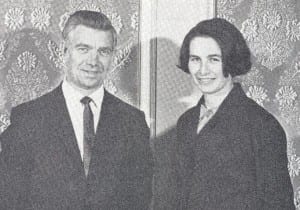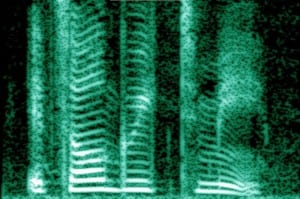Jack Ashley was President of Action on Hearing Loss, formerly the RNID, from 1987 when he succeeded Lord Chalfont. Losing his hearing in 1967 after an operation, in his two autobiographies Journey into silence (1973) and Acts of defiance (1992) Ashley describes how he came to be involved with the RNID. Helen Keller had recently died and there was talk of a joint Blind/Deaf fund in her memory. He hoped to bring the two groups together.
The General Secretary at the Royal National Institute for the Deaf was helpful and anxious that the venture should succeed. But he did not seem optimistic and I did not press him to explain his reservations. When I went to the Royal National Institute for the Blind I understood his pessimism. The building was far more impressive than that of the Institute for the Deaf and it was much better staffed; although by no means lavish, it was clearly better endowed. The General Secretary was pleasant, brisk and willing to consider any initiatives and attend exploratory meetings for a joint fund; but whereas the officials for the deaf strongly supported my provisional plan, those of the blind were not notably enthusiastic.
He continues further on,
I later learned that the blind have charitable donations of some £2,000,000 a year compared with £20,000 for the deaf. With public generosity biased to this extent, I began to understand why the blind chose to avoid cooperating with the deaf.
The poverty of the organisation for the deaf is a reflection of the striking difference in the public attitude to the two disabilities. The average person feels gratified helping a blind man across the road; he feels he has done his good deed for the day. But co-operation with the deaf involves positive and continuous help rather than a gesture which is soon over and done with. (Journey into silence p.164-5)
Ashley was approached by Air Vice-Marshal E.D.D. Dickson, Chairman of the RNID from 1960-1971, to go to Edinburgh and give the opening address at their biennial conference in October 1968.
The invitation posed an interesting question. Was I to begin campaigning for deaf people now that I was myself deaf, and would this be seen as special pleading? […]I thought the best thing would be to try to help deaf people in much the same way as I would aim to help all others who were disabled. (Acts of defiance1992, p.176).

Jack and Pauline in Edinburgh
Suffering from tinnitus, his memories of Edinburgh were dominated by “the shrieking and roaring in my head […] as they have on so many occasions since.” He had a warm reception, and spoke widely, including about his anger at attitudes to deafness in the public and media.
The audience responded generously, and the media coverage was extensive. At Edinburgh, I struck a small blow for deaf people and passed another landmark in my own rehabilitation.
In Acts of defiance, Ashley devotes a chapter to deafness called Deaf World. He talks of his frustrations with patronising colleagues, the difficulties of trying to lip-read. “In striking contrast to those prejudiced against deaf people, Princess Diana did all she could to help.” (ibid, p.344). He describes how he became RNID President –
The RNID, an old-established organisation, had an elderly feel when I first came into contact with it. After speaking at the Edinburgh conference in 1968, just after losing my hearing, my relationship with it was restricted to keeping in touch with its officers and speaking at occasional meetings.
However, in 1986, with new leaders and a more demanding membership, it became more thrusting and effective. Its Chief Executive, Mike Whitlam, gathered together a team of professional directors, clarified its image and adopted a higher profile.[…] He was supported by an energetic, intelligent Chairman, Winifred Tumin, the mother of two deaf daughters.[…] I served for a while on its General Management Committee and then, in October 1987, I was elected President.
Jack Ashley did a tremendous amount to help people in his life and we will just highlight some of his contributions in speaking out in the cause of Deaf People in Parliament and elsewhere for more than forty years –
- He encouraged the government to make television companies to have a greater percentage of subtitles under the Broadcast Bill in 1990 than was originally intended (Acts of defiance 1992, p352-3).
- Having seen how it helped his mother, in 1973 he pressed Keith Joseph to give all deaf people a behind-the-ear hearing aid free of charge (Acts of defiance 1992, p345).
- Along with RNID representatives and the consultant and tinnitus expert Jonathan Hazell, he founded the British Tinnitus Association in a room at the House of Commons in November 1979 (Acts of defiance 1992, p.351).
- He tabled an Early Day Motion calling upon the Government to give official recognition to BSL and to remedy the shortage of fully trained interpreters (EDM 943). Sign Language. British Deaf News. 1991, Sep, 5.
- The common belief that an 18th-century statute debarred ‘deaf and dumb’ people from becoming MPs was refuted by the Lord Chancellor in a letter to Lord Ashley stating that there is “nothing in common law, customs of Parliament or statute preventing a deaf person from becoming an MP”. See Hear, 1995, Dec, 6.
- The All-Party Disablement Group is a Parliamentary group that was founded by Jack Ashley in 1969 and chaired by him for forty years . BABER, P. Never a backbench issue. Disability Now, 1998, Nov, 14.
- The Jack Ashley Millennium Awards for Young Deaf People (1999-2002). “By the end of the initiative’s three-year lifetime, 150 young deaf people had, between them, received £789,305 worth of awards.” Talk, 1999, 171, 6, and 172, 13; Talk, 2001, 182, 4. (Includes list of winners); Curtain comes down on Awards scheme. Talk, 2002, 189, 17; ‘Graduation’ ceremony honours UK’s finest. Talk, 2003, 191, 18-19.
- His wife Pauline, a governor at the Royal National Throat Nose and Ear Hospital, with the help from specialists at the hospital established the Hearing Research Trust to help fund research into deafness (now Deafness Research UK) in 1985. Jack Ashley became the President.
- The RNID and the Jules Thorne Charitable Trust had given funding to Graham Fraser, the pioneer of cochlear implants at UCL, for a programme of implants. In 1989 Ashley took a deputation that included Fraser to see the Health Minister David Mellor, who then managed to get NHS funding for a four year funding of cochlear implants.

UCL Provost Dr. Derek Roberts and Jack Ashley at the RNID Library, January 1994
 Close
Close




